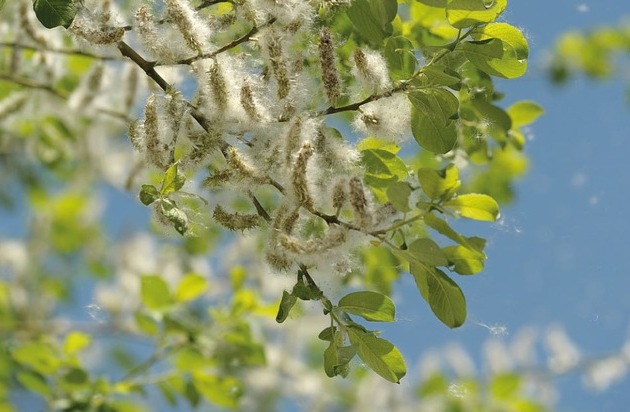Aroniaberry eV
Dresden (OTS)
Sneezing, itching, conjunctivitis, drowsiness during the day. Those with hay fever have had the usual symptoms since January due to the mild winter. Approximately 15% of adults in Germany and every tenth children suffer from hay fever. “Our gut is very involved in making the decision about whether the body has an allergy,” the doctor explains. Certified Nutrition and Health Consultant Claudia Michaela Hooft. The expert says that the right diet can provide great relief and shorten the reaction time.
Like the millions of Germans who aren’t afflicted with pesky hay fever, they might think that pollen season doesn’t start until spring. However, allergy sufferers and especially those allergic to hazelnuts or alder know best: flowering of some types of plants can begin as early as January, depending on the weather, of course. Since we only have a mild winter this year, the weather and pollen information services are reporting Monday’s occurrence as early as January.
Why do you get hay fever?
Hay fever is one of the most common allergic diseases. In Germany alone, the number of sufferers is several million. Almost every third person will develop allergic diseases in their lifetime. And the trend is increasing every year. “Our gut is very involved in making the decision about whether the body has an allergy,” the doctor explains. Certified Nutrition and Health Consultant Claudia Michaela Hooft.
“The gut is the seat of the immune system,” we’ve heard that saying before…but what does the gut have to do with hay fever? A disturbed gut microbiota can significantly weaken our defenses and allergic reactions, such as hay fever, caused by overreactions of the immune system. If the immune system is weakened, it will not be able to properly distinguish between harmless and dangerous proteins, such as pollen, and react to the usual symptoms of hay fever. Since pollen proteins usually reach the body through the mucous membranes, that is, through the eyes, nose and throat, typical symptoms appear here as well. People with hay fever often suffer from so-called cross-allergies, so they also have to avoid certain foods.
Good “fodder” for the intestines
Since the intestines can be considered the seat of the immune system, it is especially important for allergy sufferers to provide it with fiber. These provide good “nourishment” for the intestinal bacteria. In addition, it is recommended to consume a sufficient amount of plant pigments of red and blue color (anthocyanins), as they strengthen and strengthen the intestines and immune system. Thus, the overactive defensive reactions of the immune system, which cause allergies, are reduced, and the body becomes less susceptible to environmental influences. Anthocyanins are found mainly in blue, purple or red vegetables and fruits. The original aronia berries are especially rich in red and blue plant pigments. In addition to valuable secondary plant substances that supply the immune system with antioxidants and thus naturally strengthen it, they also contain pectin, which stimulates intestinal activity.
Good fats strengthen the immune system
Unfortunately, it is not enough to rely solely on the power of fiber and antioxidants. Because the balanced supply of high-quality fatty acids also satisfies the intestines, and therefore is important for the immune system. Black cumin oil, for example, contains linoleic acid in addition to essential oils and thus can strengthen the immune system.
“Here it is recommended to drop the saliva of a teaspoon of oil with a piece of brown bread,” the expert continues, because the active ingredients are already absorbed through the oral mucosa. If the pure oil tastes too bitter for you, you can also use black cumin oil capsules. Taking black cumin oil capsules daily with 100ml of mother aronia juice can provide allergy sufferers with great relief and shorten the reaction time. But even those without allergies benefit from the power of aronia oil and black cumin oil. Strengthening the immune system can significantly reduce the urge to develop allergies in the first place.
swell:
Bergmann (et al.): Current status of allergy prevalence in Germany; Position paper from the Environmental Medicine Authority at the Robert Koch Institute. 2016. Available online: https://ots.de/jIOMuN; Retrieved on March 26, 2022.
Antioxidant effect of Aronia Oszmiánski and Wojdylo: Aronia melanocarpa phenols and their antioxidant action. 2005. C_Springer-Verlag 2005. Available online: https://ots.de/d7lBQR; Zheng and Wang: Oxygen radical uptake capacity of phenols in cranberries, cranberries, blueberries, and cranberries. 2003. Journal of Agricultural and Food Chemistry 51 (2): 502-9.
Badescu’s immune system, M. (and others): Effects of extracts of Sambucus nigra and Aronia melanocarpa on immune system disorders within diabetes mellitus. 2015. Available online: https://www.ncbi.nlm.nih.gov/pubmed/25327310; Accessed on 03-26-2020. Xu, J., Mojsoska, B: The immunomodulating effect of an aronia extract lacks association with the antioxidant anthocyanins. 2013. Available online: https://www.ncbi.nlm.nih.gov/pubmed/23566059; Retrieved on March 26, 2022.
Media contact:
Aronia Berry E. Fifth
Traubelstrasse 13 A
Building 44
01109 Dresden
Mail: [email protected]
Tel: +49 351 41886645
Original content from: Aroniabeere eV, transmitted by aktuell news

“Total coffee aficionado. Travel buff. Music ninja. Bacon nerd. Beeraholic.”









More Stories
Coral Seeding: Artificial Insemination Makes Coral More Heat Tolerant
Fear, Anger, and Denial: How People Respond to Climate Change – Research
LKH Graz: Using radiation to combat heart arrhythmias